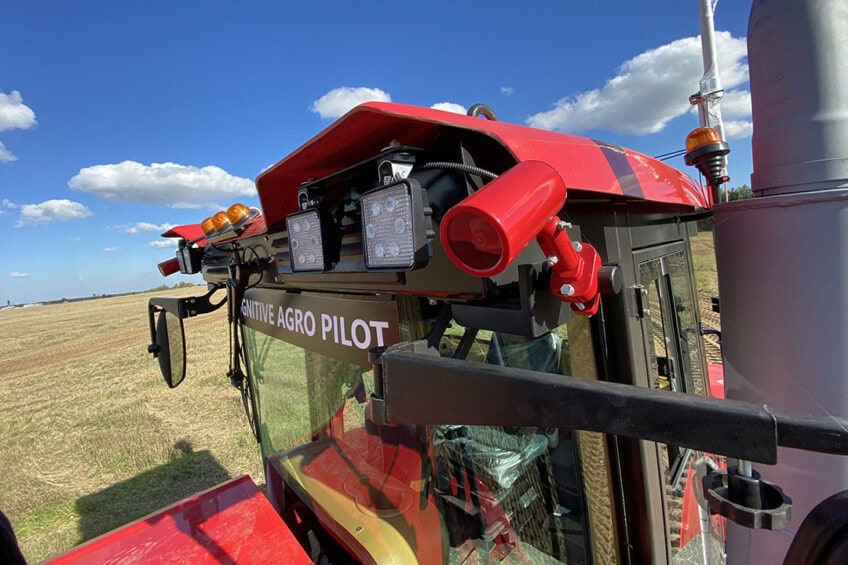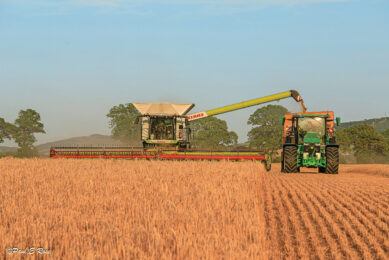Russian unmanned tractors to hit the fields in large numbers

The St. Petersburg Tractor Plant (PTZ) and the developer of artificial intelligence systems for robotic agricultural machinery Cognitive Pilot will start the world’s first mass production of Kirovets tractors operated by an AI-based autopilot system. 10,000 unmanned tractors are to be in operation in Russia by 2024.
The two companies signed an agreement, under which the project will be implemented in three stages. As a result, three autopilot systems will be released with a gradual increase in unmanned control capabilities. In the first two stages, the presence of a driver in the tractor cab is mandatory.
Autopilot system installed on Kirovets PTZ tractor
A robotic kit with the first version of the autopilot system Cognitive Agro Pilot has already been installed on a Kirovets PTZ tractor. The unmanned machine can reportedly move along a trajectory in autonomous mode with automatic control of optimal speed, transmission parameters, slip, and engine load. It can also stop automatically when obstacles occur, and work in poor visibility conditionsaccording to Cognitive Pilot. There is more to come, as several advanced features are currently being finalised.
“Based on information from the sensors, a comprehensive analysis of the state of the soil and crops is carried out, including the assessment of plant vegetation and disease damage,” Cognitive Pilot said, adding that these options are to be introduced by 2022.
“In the current version, the AI system automatically transmits progress reports to the tractor owners. It also sends machine telematics, work progress reports consisting of photo and video data and so on to the agricultural companies’ operational systems,” Cognitive Pilot said.
GNSS
One of the essential features of Cognitive Pilot’s system is its high-precision positioning system (GNSS), which is necessary to perform operations in areas where there are no visual reference points and in areas where fields of different farms are delimited.
“This feature will also allow you to automatically draw maps based on satellite imagery, set up harvesting schemes, plan automatic headland turns of equipment and directions of movement, which the system’s computer vision can correct,” Cognitive Pilot said.

Second stage
In the second stage, the system functionality will be expanded with the new options of autonomous turns, automatic calculation of the optimal operation route, as well as course adjustments using visual landmarks, such as the edge of cultivated areas and tramlines.
In addition, Cognitive Pilot plans to introduce automatic control of a given set of trailed implements, like plows, mowers, harrows, or sprayers, as well as automated video analysis and field control functions, including mapping stones, assessing plant vegetation, plant damage by diseases or pests. Also, the tractor equipment will be supplemented with a set of side-view sensors, with which monitoring the areas to the left and right of the tractor is made possible.
Third stage: unmanned tractors
The third stage is an unmanned tractor control mode without human intervention. It also will involve an option where a fleet of tractors can operate autonomously, with several tractors following a “flagship tractor”. This fleet could also drive towards the field autonomously on non-public roads. Another development is a robotic tractor that can be “paired” with a combine harvester (driven by an operator), and other features.
According to Cognitive Pilot the Kirovets K-7M tractor with autopilot would be by 15 to 20% more effective compared to the same, human-operated tractor. Besides, companies using tractors with autopilots would be saving 70% to 80% on repair and maintenance costs, claims Cognitive Pilot, which would be mainly attributed to the machine telematics data whith which the tractors can be monitored.
Text continues underneath video
With this project, Cognitive Pilot targets to stay ahead of foreign competitors also engaged in developing robotic solutions for advanced agricultural operations. Deliveries of tractors with autopilot will begin once the first field tests are completed, which is expected by the end of October 2021. First, a batch of 10-20 units will be released, while the large-scale production of Kirovets tractors K-7M equipped with an autopilot system is planned to begin in February 2022.
Unmanned tractors available in 2024
Serial production of the K-7M tractors with the Cognitive Agro Pilot system with the possibility of full autonomy is scheduled for January 2024.
“The intention to introduce unmanned tractors with AI-based autopilot system is seen among almost all leading manufacturers of agricultural machinery. However, in their production schedules, mass production of fully autonomous tractors is expected by 2026 – 2027, while the agreement between PTZ and Cognitive Pilot makes the commercial introduction of a fully unmanned version by 2024 possible,” Cognitive Pilot said.
The company estimates that the Russian tractors with autopilot would cost from 8 to 12 million rubles (€ 96,000 – € 145,000, or USD 112,000-170,000).
By 2024, when the serial production of the third-stage unmanned tractors is expected to begin, Cognitive Pilot targets to have 10,000 unmanned tractors already in operation in Russia. The company plans to enter foreign markets in 2024.
According to a report by MarketsandMarkets, the global autonomous tractors market witnessed demand for 12,508 units in 2019. This is to grow to 60,901 units by 2025. According to research by Reportlinker, in monetary terms, the global autonomous tractors market would grow from $ 1.5 billion in 2020 to $ 7.5 billion in 2028.
Join 17,000+ subscribers
Subscribe to our newsletter to stay updated about all the need-to-know content in the agricultural sector, two times a week.



